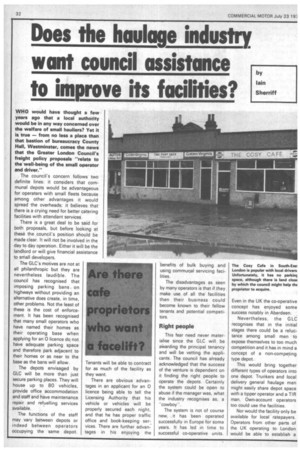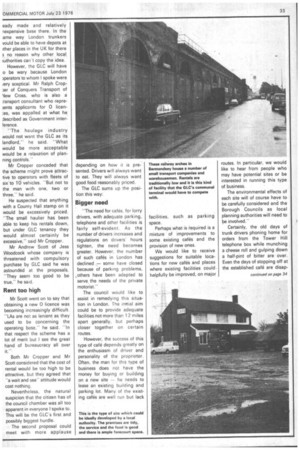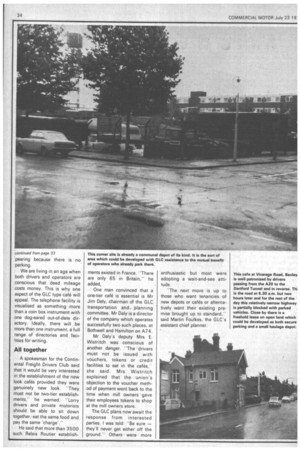Does the haulage industry want council assistance
Page 34

Page 35

Page 36

If you've noticed an error in this article please click here to report it so we can fix it.
to improve its facilities? by lain Sherriff
WHO would have thought a few • years ago that a local authority .wodld be in any way concerned over the welfare of small hauliers? Yet it
is true — from no lets a place than that bastion of bureaucracy County 'Hall. 'Westminster, comes the news that the Greater London Council's freight policy proposals "relate to the well-being of the small operator and driver."
The council's concern follows two definite lines: it considers that cornmunal depots would be advantageous for operators with small fleets because among other advantages it would spread the overheads; it believes that there is a crying need for better catering facilities with attendant services There is a great deal to be said .for both proposals, but before looking at these the council's position should be Made clear. It will not be involved in the day to day operation. Either it Will be the landlord or will give financial assistance to small developers.
The GLC's motives are not at all philanthropic but they are nevertheless laudible. The council has recognised that imposing parking bans. on highways without providing an alternative does create, in time, other problems. Not the least of these is the cost of enforce ment. It has been recognised that many small operators who have named their homes as their operating base when applying for an 0 licence do not have adequate parking space and therefore park adjacent to their homes or as near to the base as the bans will allow.
The depots envisaged by GLC will be more than just secure parking places. They will house up to 80 vehicles, provide office accommodation and staff and have maintenance repair and refuelling services available.
The functions of the staff may vary between depots or indeed between operators occupying the same depot. Tenants will be able to contract for as much of the facility as they want.
There are obvious advantages in an applicant for an 0 licence being able to tell the Licensing Authority that his vehicle or vehicles will be properly secured each night, and that he has proper traffic office and book-keeping services. There are further advantages in his enjoying the benefits of bulk buying and using communal servicing facilities.
The disadvantages as seen by many operators is that if they make use of all the" facilities then their business could become known to their fellow tenants and potential competitors.
Right people This fear need never materialise since the GLC will be awarding the principal tenancy and will be vetting the applicants. The council has already acknowledged that the success. of the venture is dependent on it finding the right people to operate the depots. Certainly the system could be open to abuse if the manager was, what the industry recognises as, a "cowboy".
The system is not of course new, it has been operated successfully in Europe for some years. It has led in time to successful co-operative units. Even in the UK the co-operative concept has enjoyed some success notably in Aberdeen.
Nevertheless, the G LC recognises that in the initial stages there could be a reluctance among small men to expose themselves to too much competition and it has in mind a concept of a non-competing type depot.
This would bring together different types of operators into one depot. Trunkers and local delivery general haulage men might easily share depot space with a tipper operator and a TIR man. Own-account operators too could use the facilities.
Nor would the facility only be available for local ratepayers. Operators from other parts of the UK operating to London would be able to establish a
eady made and relatively nexpensive base there. In the .ame way London trunkers vould be able to have depots at ither places in the UK for there 3 no reason why other local iuthorities can't copy the idea.
However, the GLC will have o be wary because London )perators to whom I spoke were iery sceptical. Mr Ralph Crop)er of Conquers Transport of \Jew Cross, who is also a :ransport consultant who repreients applicants for 9 licen;es, was appalled at what he iescribed as Government interference.
"The haulage industry would not want the GLC as its landlord," he said. "What would be more acceptable would be .a relaxation of planning controls."' Mr Cropper conceded that the scheme might prove attractive to operators with fleets of six to 10 vehicles. "But not to the man with one, two or three,he said.
He suspected that anything with a County Hall stamp on it would be excessively priced. "The small haulier has been able to keep his rentals down, but under GLC tenancy they would almost certainly be excessive,said Mr Cropper.
Mr Andrew Scott of Jess Woodcock whose company is threatened with compulsory purchase by GLC said he was astounded at the proposals. "They seem too good to be true," he said.
Rent too high
Mr Scott went on to say that obtaining a new 0 licence was becoming increasingly difficult. "LAs are not as lenient as they used to be concerning the operating base," he said. "In that respect the scheme has a lot of merit but I see the great hand of bureaucracy all over it."
Both Mr Cropper and Mr Scott considered that the cost of rental would be too high to be attractive, but they agreed that "a wait and seeattitude would cost nothing.
Nevertheless, the natural suspicion that the citizen has of the council chamber was all too apparent in everyone I spoke to. This will be the GLC's first and possibly biggest hurdle, The second proposal could meet with more applause depending on how it is presented. Drivers will always want to eat, They will always want good food reasonably priced.
The GLC sums up the position this way:
Bigger need
"The need for cafés, for lorry drivers, with adequate parking, telephone and other facilities is fairly self-evident. As the number of drivers increases and regulations on drivers' hours tighten, the need becomes greater. However, the number of such cafés in London has declined — some have closed because of parking problems, ,others have been adapted to serve, the needs of the private motorist."
The council would like to assist in remedying this situation in London. The inttial aim could be to provide adequate facilities not more than 12 miles apart generally, but perhaps closer together on certain routes.
However, the success of this type of café depends greatly on the enthusiasm of driver and personality of the proprietor. Often, the man for this type of business does not have the money for buying or building on a new site — he needs to lease an existing building and parking lot. Many of the existing cafés are well run but lack facilities, such as parking space.
Perhaps what is required is a mixture of improvements to some existing cafes and the provision of new ones.
We would like to receive suggestions for suitable locations for new cafés and places where existing facilities could. helpfully be improved, on major routes. In particular, we would like to hear from people who may have potential sites or be interested in running this type of business.
The environmental effects of each site will of course have to be carefully considered and the Borough Councils as local planning authorities will need to be involved."
Certainly, the old days of trunk drivers phoning home for orders from the Tower Hill telephone box while munching a cheese roll and gulping down a half-pint of bitter are over. Even the days of stopping off at the established café are disap 'peering because there is no parking.
We are living in an age when both drivers and operators are conscious that dead mileage costs money. This is why one aspect of the GLC type cafe will appeal. The telephone facility is visualised as something more than a coin box instrument with one dog-eared out-of-date directory. Ideally, there will be more than one instrument, a full range of directories and facilities for writing.
All together
A spokesman for the Continental Freight Drivers Club said that it would be very interested in the establishment of the new look cafés provided they were genuinely new look. "They must not be two-tier establishments," he warned. "Lorry drivers and private motorists should be able to sit down together, eat the same food and pay the same 'charge'."
He said that more than 3500 such Releis Routier establish
ments existed in France. ''There are only 65 in Britain,he added.
One man convinced that a one-tier café is essential is Mr Jim Daly, chairman of the GLC transportation and. planning committee. Mr Daly is a director of the company which operates successfully two such places, at Bothwell and Hamilton on A74.
Mr Daly's deputy Mrs E. VVistritch was conscious of another danger. "The 'drivers must not be issued with vouchers, tokens or credit facilities to eat in the cafés, she said. Mrs Wistritch explained that the union's objection to the voucher method of payment went back to the time when mill owners gave their employees tokens to shop at the mill owners store.
The GLC plans now await the response from interested parties. I was told: "Be sure — they'll never get either off the ground." Others were more enthusiastic but most were adopting a wait-and-see attitude.
"The next move is up to those who want tenancies of new depots or cafés or alternatively want their existing premise brought up to standard,said Martin Foulkes, the GLC's assistant chief planner.
This cafe at Vicarage Road. Bexley is well patronised by drivers passing from the A20 to the Dartford Tunnel and in reverse. Thi is the road at 6.30 a.m. but two hours later and for the rest of the day this relatively narrow highway is partially blocked with parked vehicles. Close by there is a freehold lease on open land which could be developed as both secure parking and a small haulage depot.
















































































































